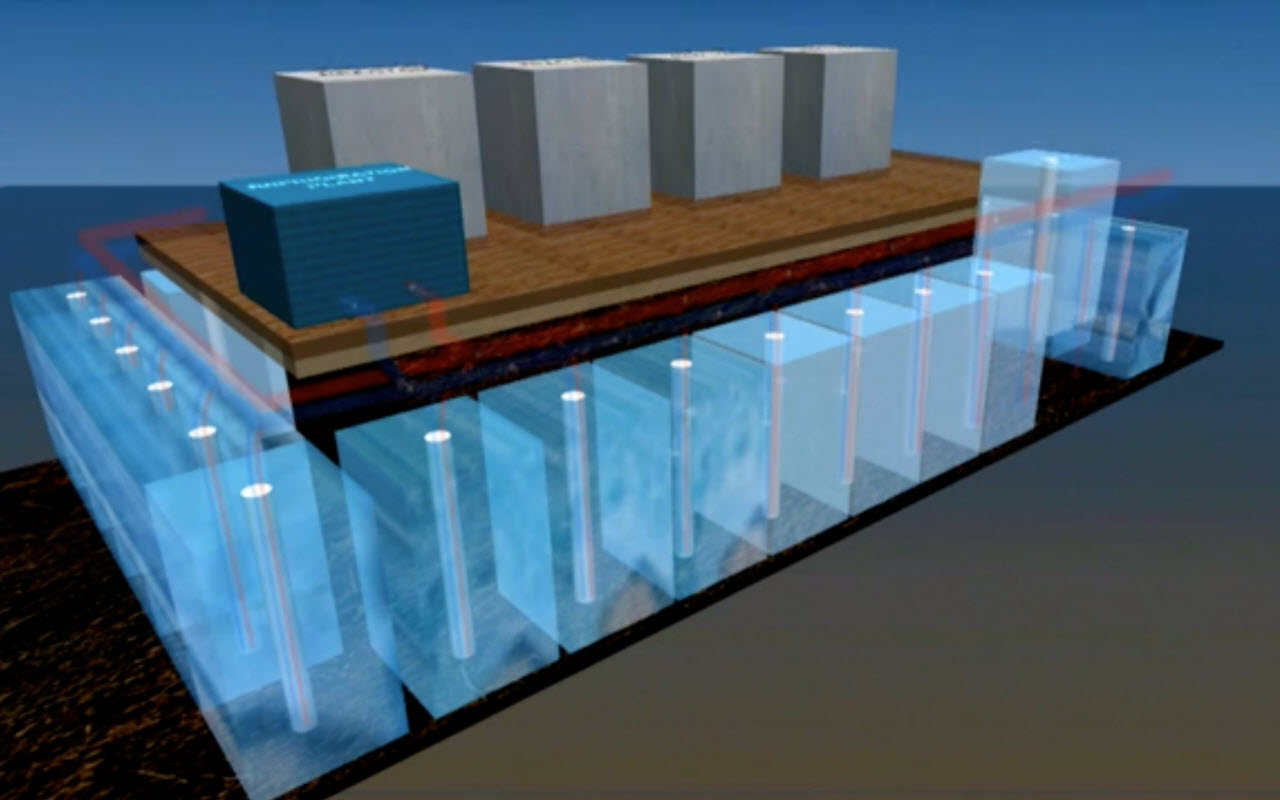
Giant underground ice wall approved to protect Fukushima plant water
theverge.com -- May 27

Japan intends to move forward with an ambitious plan to freeze the ground around its damaged Fukushima nuclear plant, creating a so-called underground ice wall to prevent water that's been contaminated with radioactive materials from escaping and entering the broader water supply.
Japan adopted the plan in September of last year, and the AFP reports that its nuclear regulator has now approved it, with construction scheduled to start next month.
The project intends to freeze the ground around four reactors, as well as other related buildings, at Fukushima down to a depth of nearly 100 feet. In total, the frozen wall of earth will stretch for nearly nine-tenths of a mile and is meant to reach temperatures of minus 40 degrees Fahrenheit (minus 40 degrees Celsius). A series of pipes carrying coolant will be used to freeze the land. Beyond preventing water from escaping the area, the AFP reports that the hope is that it will also prevent water from flowing into the plant from nearby hillsides. Construction is expected to finish in March of 2015 and cost about 32 billion yen ($314 million).
The AFP reports that some aspects of the plan may still be subject to approval by Fukushima plant operator Tokyo Electric Power Co (TEPCO). And even after construction begins, there are likely to be lasting concerns. While walls of frozen earth have reportedly been used in the past for tunnels and subways, they've never been used for a purpose like Fukushima's and not for the length of time that it'll take - potentially several decades - for the plant to be decommissioned.
Other concerns over the expensive plan were raised on Friday, before its approval today, at a meeting with Japan's Nuclear Regulation Authority. Both government officials and experts expressed questions over the plan's efficacy, according to the Associated Press, asking whether it will actually be able to prevent water contamination over the long term and if it might cause any problems for the area in doing so. Ultimately, those concerns were't enough to hold the plan back, but it'll be necessary to watch its progress to see if the wall's goals are actually fulfilled.
http://newsonjapan.com/html/newsdesk/article/107787.php


ยุ่นแผนสูง!!! น่าทึ่ง!!! กำแพงน้ำแข็งขนาดยักษ์!!! ป้องกันน้ำปนเปื้อนจากโรงไฟฟ้า FUKUSHIMA ได้ไฟเขียวติดตั้งแล้ว!!!
Giant underground ice wall approved to protect Fukushima plant water
theverge.com -- May 27
Japan intends to move forward with an ambitious plan to freeze the ground around its damaged Fukushima nuclear plant, creating a so-called underground ice wall to prevent water that's been contaminated with radioactive materials from escaping and entering the broader water supply.
Japan adopted the plan in September of last year, and the AFP reports that its nuclear regulator has now approved it, with construction scheduled to start next month.
The project intends to freeze the ground around four reactors, as well as other related buildings, at Fukushima down to a depth of nearly 100 feet. In total, the frozen wall of earth will stretch for nearly nine-tenths of a mile and is meant to reach temperatures of minus 40 degrees Fahrenheit (minus 40 degrees Celsius). A series of pipes carrying coolant will be used to freeze the land. Beyond preventing water from escaping the area, the AFP reports that the hope is that it will also prevent water from flowing into the plant from nearby hillsides. Construction is expected to finish in March of 2015 and cost about 32 billion yen ($314 million).
The AFP reports that some aspects of the plan may still be subject to approval by Fukushima plant operator Tokyo Electric Power Co (TEPCO). And even after construction begins, there are likely to be lasting concerns. While walls of frozen earth have reportedly been used in the past for tunnels and subways, they've never been used for a purpose like Fukushima's and not for the length of time that it'll take - potentially several decades - for the plant to be decommissioned.
Other concerns over the expensive plan were raised on Friday, before its approval today, at a meeting with Japan's Nuclear Regulation Authority. Both government officials and experts expressed questions over the plan's efficacy, according to the Associated Press, asking whether it will actually be able to prevent water contamination over the long term and if it might cause any problems for the area in doing so. Ultimately, those concerns were't enough to hold the plan back, but it'll be necessary to watch its progress to see if the wall's goals are actually fulfilled.
http://newsonjapan.com/html/newsdesk/article/107787.php